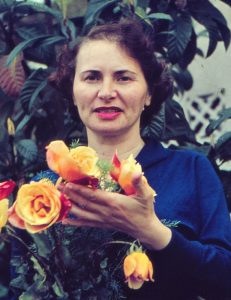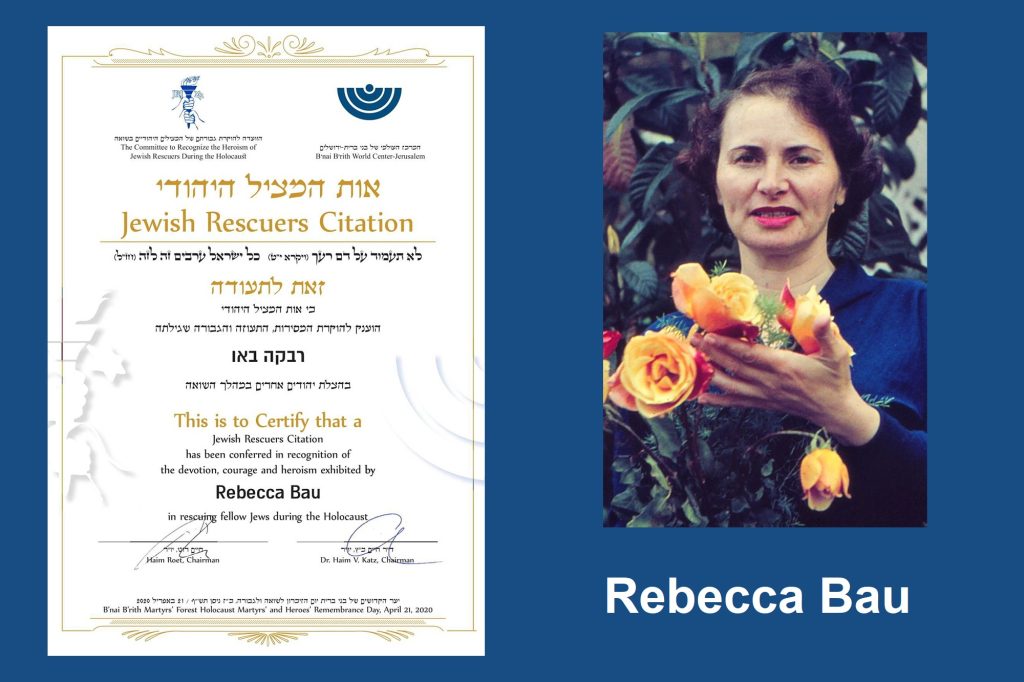Home / About Us / Biography – Rebecca Bau
Biography – Rebecca Bau
REBECCA BAU
The Life of Rebecca Bau – A Heroic Woman
 Rebecca Bau was born in 1918 in the village of Budilov, Poland. Her father, Binyamin Tennenbaum, and her mother, Leah, were from the Greenhut family. Her father was a doctor, veterinarian, and naturopath. For generations, her family had been doctors, pharmacists, and naturopaths. Rebecca lost her mother at the age of seven. Her father couldn’t raise the three children by himself, so he sent them to live with relatives. Rebecca lived with aunts who treated her poorly, and she suffered greatly. Finally, she reached her Aunt Roza, where she had a good life. From a young age, she loved helping everyone, and despite her difficult life, she was never depressed; she only wanted everyone to be happy.
Rebecca Bau was born in 1918 in the village of Budilov, Poland. Her father, Binyamin Tennenbaum, and her mother, Leah, were from the Greenhut family. Her father was a doctor, veterinarian, and naturopath. For generations, her family had been doctors, pharmacists, and naturopaths. Rebecca lost her mother at the age of seven. Her father couldn’t raise the three children by himself, so he sent them to live with relatives. Rebecca lived with aunts who treated her poorly, and she suffered greatly. Finally, she reached her Aunt Roza, where she had a good life. From a young age, she loved helping everyone, and despite her difficult life, she was never depressed; she only wanted everyone to be happy.
She wanted to study medicine in Kraków at a time when Jews were not allowed to attend university, so she studied chemistry and cosmetology. When World War II broke out, she was sent to the Kraków Ghetto. There, she trained to become a nurse, worked in the hospital, and helped many Jews.
In 1943, she was transferred to the Plaszow concentration camp, where she saved many people thanks to her skills as a cosmetologist, providing pedicures and manicures. She cared for those the Nazis saw as sick because they limped and did not appear fit for work, saving them from death by giving them pedicures. Rebecca was so skilled that even the Nazis asked her to give them pedicures and manicures. Her reputation reached the camp commander, Amon Goeth, who summoned her to give him a manicure at night after she had worked all day at hard labor. This scene appears in the film “Bau artist at war” and “Schindler’s List.” Rebecca knew nine languages, she could read, write, and speak German, and also served as a spy. When she visited Goeth’s house, she understood his plans for the following day: whom he intended to kill, who would be hanged, and who would be burned. When she returned to her barracks, the women eagerly awaited news about the future, and Rebecca’s information spread, saving many lives.
In the concentration camp, she met the man who would become her husband, Joseph Bau. Disguised as a woman, he sneaked into the women’s camp, where they married in secret, risking their lives. Their wedding is depicted in the films “Bau artist at war” and “Schindler’s List.”
Mietek Pemper, Goeth’s secretary, was one of those who helped create Schindler’s List. He added Rebecca to the list as thanks for saving his mother. Rebecca was a very brave woman who knew no fear. She had a strong belief that she would survive and asked that her name be replaced with her new husband’s name, while she herself was sent to Auschwitz. This is how Joseph made it onto Schindler’s List. Only 50 years later did Rebecca reveal this. When Joseph asked her in shock, “Why did you switch your name with mine, and why didn’t you tell me?” she replied, “I didn’t tell you because I didn’t want you to feel like you owed me anything and I did it out of love.”
In her diaries, “In the name of God,” which she wrote in secret and were discovered after her death, Rebecca wrote, “When my diaries are found, people will know who saved my Uzu.” Their love was very strong for 53 years.
In Auschwitz, they tattooed the number A-27541 on her arm. Even there, she saved many lives, risking her own. From Auschwitz, she was sent to the Lichtewarden concentration camp in Czechoslovakia. After the war, Rebecca and Joseph miraculously found each other and returned to Kraków. There, Rebecca began working as a cosmetologist and became very successful. She opened a school for cosmetology, and Joseph returned to studying art at the university. In 1950, they immigrated to Israel with their daughter, Hadasa. In Israel, Rebecca continued working as a cosmetologist, helping many people with their appearance. She also served as the neighbourhood doctor, helping in emergencies.
In 1956, their second daughter, Clila, was born.
Rebecca and Joseph Bau openly spoke about the Holocaust and encouraged others to share stories about the horrors of the war. They did this in their unique way, which made people want to listen and learn. They succeeded in this during a time when most survivors did not talk about their terrible past, and other Israelis didn’t want to hear. As a cosmetologist, Rebecca listened to her clients, many of whom had been in the Holocaust, serving as a sympathetic ear and encouraging them to share their experiences. The women told her their stories, repeating them over and over, and Rebecca always listened, serving as a psychologist for them.
All of Rebecca Bau’s family was murdered, as was Joseph’s family.
In 1975, after 36 years of searching, Rebecca found her brother, Oscar, in Israel, thanks to her persistence in not giving up, even though everywhere she turned, she was told they had no information about him.
She testified in six trials against Nazis who were captured. Rebecca was a very optimistic woman who never complained and was content with what she had.
Rebecca and Joseph Bau lived very happy lives, full of joy and humour. Their love was larger than life, and they were the most romantic couple of all time. In 2020, both received the Jews Saving Jews award from B’nai B’rith International.
Some of Rebecca’s sayings, which she wrote in her diaries “In the name of God”:
“When they throw stones at you—throw bread!”
“Men and women, don’t do foolish things. Remember, life isn’t eternal.”
“When you are parents, remember your children didn’t ask to come into the world. Give them solid foundations, not shaky ones.”
“Choose the kind of society you want to create.”
“Anyone who has ever been in a hospital or endured war and suffering sees life differently.”
Someone once rightly told me, “Everything flows’ “Panta Rej”
“I do not help in order to receive something in return.”
Rebecca had two daughters, Hadasa and Clila. She was blessed with four grandchildren: Sigal, Boaz, Libbi, and Eyal.
In 1997, Rebecca passed away and is buried at the Nachlat Yitzhak Cemetery in Tel Aviv.
In 2020 Joseph and Rebecca were awarded with the “Jewish Rescuers Citation”


